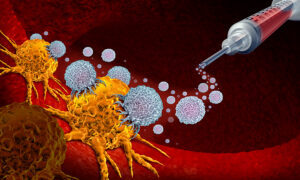Dr. Joseph Maroon discussed immunotherapy for cancer at the Anti-Aging Conference in Las Vegas, which I attended. He was one of the keynote speakers Dec. 14, 2024. He was a neurosurgeon in the past and has given many lectures at these yearly Anti-Aging Conferences before. The full title of his presentation was “Immunotherapy for cancer: history and future advances”. He started his lecture by saying that he operated on a patient with an incurable, vascular brain cancer using cryotherapy in 1992. Subsequently he was able to remove the remnants of the tumor surgically. To his surprise the patient survived. 2015 Dr. Jason Williams injected immune checkpoint inhibitors into cancer lesions following cryotherapy. This stimulated T regulatory cells and cytotoxic T cells. The remaining cancer melted away from the action of the immune cells. For many patients the treatment was successful and resulted in a cure.
Highlights of the history of immunotherapy
- 1893: William Coley published a paper where he described treatment of 900 unresectable sarcomas with a bacterial toxin. This treatment achieved high healing rates in an otherwise deadly cancer type. Tumor immunologists consider Dr. Coley now as the father of immunotherapy.
- 1982: James Allison detected tumor-associated antigen receptors. This opened up the field of cancer immunotherapy further. There are two main tumor cell surface markers: the tumor-specific antigens (TSA) and tumor-associated antigens (TAA). TSA and TAA are part of the surface markers of cancer cells, but they do not exist on the membranes of normal body cells.
- 1986: The FDA approved the first immunotherapy agent, an antitumor cytokine with the name interferon-alpha 2.
- 1998: interleukin-2 (IL-2), a T-cell growth factor that aids in immune regulation and T-cell proliferation, was approved by the FDA.
- 2011: The FDA approved check-point inhibitors. Physicians could now treat late-stage melanoma, renal cell carcinoma and lung cancer with immunotherapy.
- 2015: Dr. Jason Williams treated cancer lesions with cryotherapy and subsequently injected them with checkpoint inhibitors. This resulted in cures of the primary injected lesions, but also cured distant metastases. The treating physicians noted that there was a cure of these patients’ cancers.
- Monoclonal antibodies: here is a publication where end-stage cancer was treated with a monoclonal antibody.
- 2017: Carl June, MD from the University of Pennsylvania detected the CAR T-cell therapy. This FDA-approved personalized cellular therapy led to successful treatment of lymphoblastic leukemia in children and young adults. CAR stands for “chimeric antigen receptors”.
SYNC-T Therapy with SV-102 for prostate cancer
Dr. Maroon spent quite some time in his talk about a new treatment modality for prostate cancer. It involves cryotherapy of the prostate cancer with subsequent injection of 15 ml of an immune modulating drug (SYNC-T with SV-102). The dead prostate cancer cells function as a kind of vaccine and the medication that was injected right into the cancer lesion stimulates the T killer cells to eradicate this cancer. There was a cure rate of 85% in a pilot study. Surprisingly not only the initial prostate cancer was cured, but also far-removed metastases. Dr. Maroon believes that this kind of treatment will be the future cancer treatment protocol. At this point there is no approval yet from the FDA, but phase 2 and 3 studies are on their way.
Conclusion
I reviewed the history of immunotherapy for cancer based on a lecture by Dr. Maroon given in Las Vegas. The FDA approved interferon in 1986 for cancer treatment and checkpoint inhibitors in 2011. In 2017 Carl June, MD from the University of Pennsylvania detected CAR T-cell therapy. The FDA approved this personalized cellular therapy, which led to the successful treatment of lymphoblastic leukemia in children and young adults. In the future physicians will add various forms of immunotherapy to more conventional treatments of cancer like surgery, chemotherapy and radiotherapy. This will improve the healing successes of cancer and also the ultimate survival rates.






